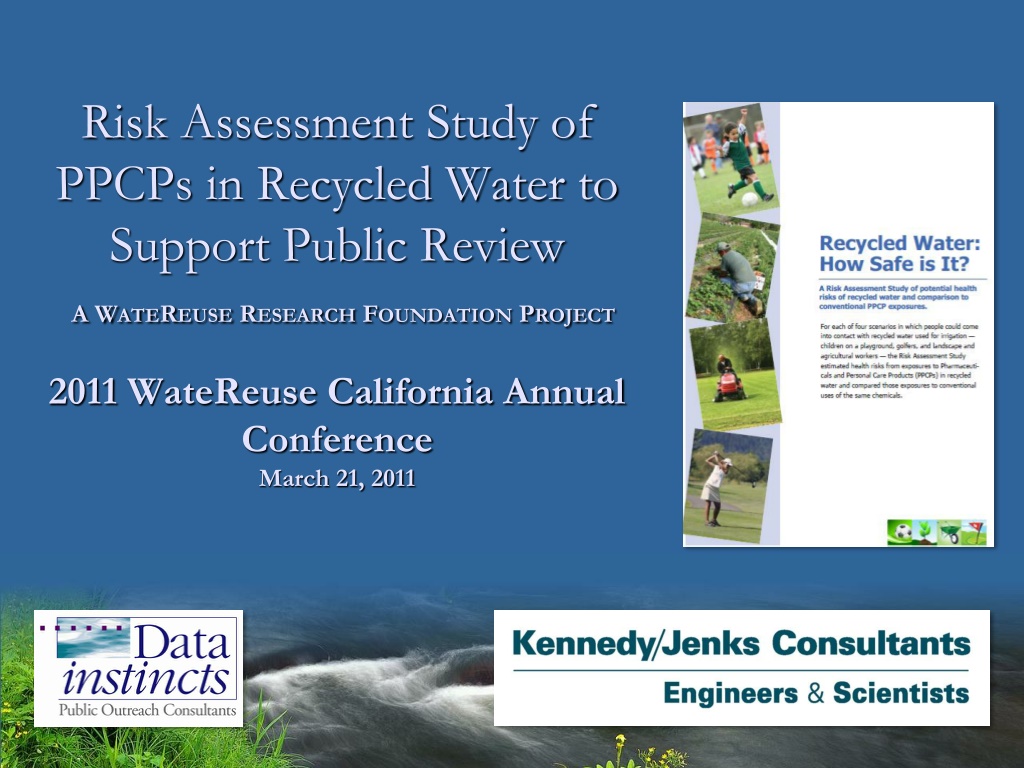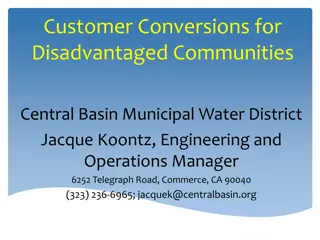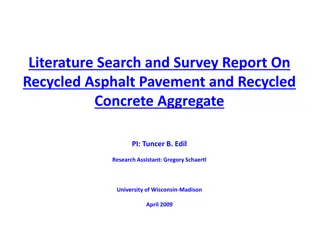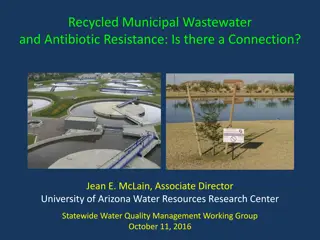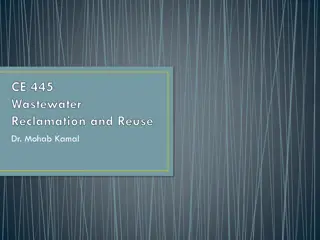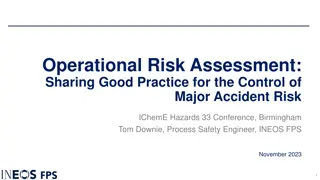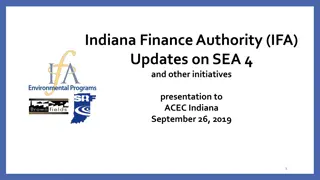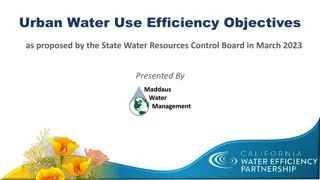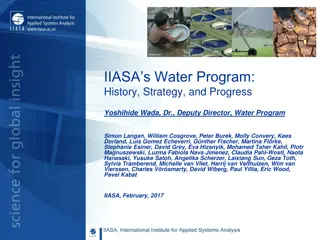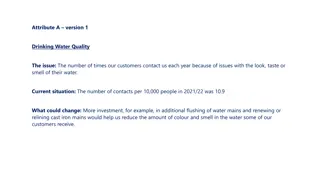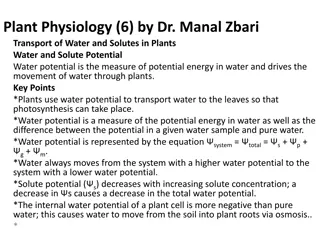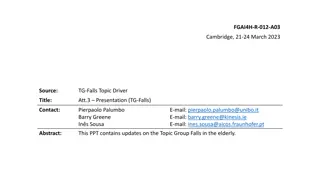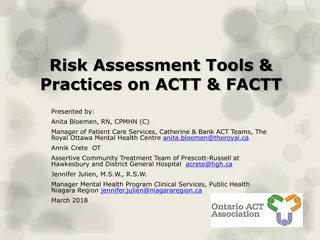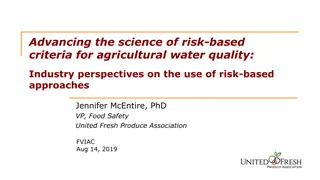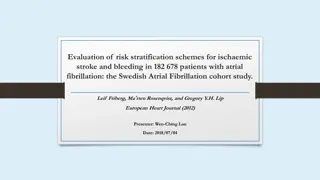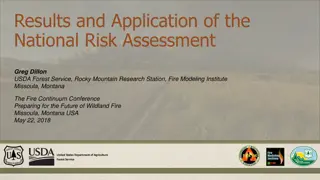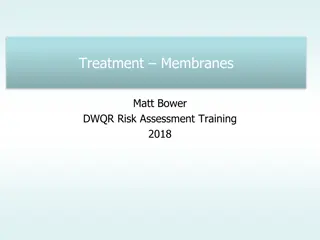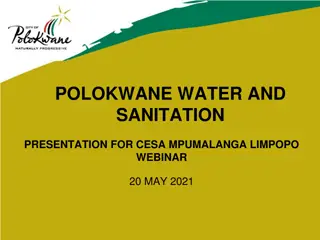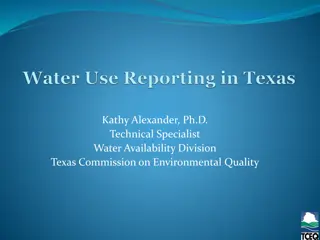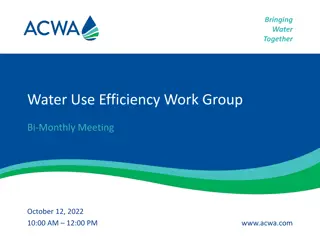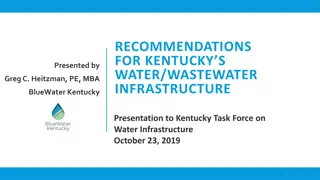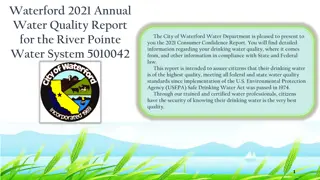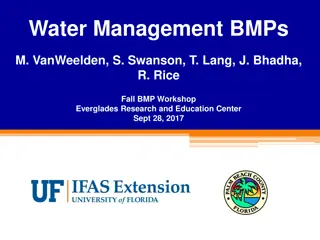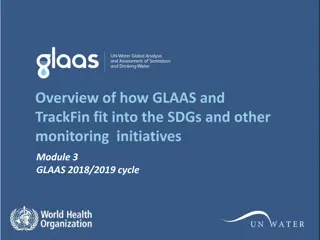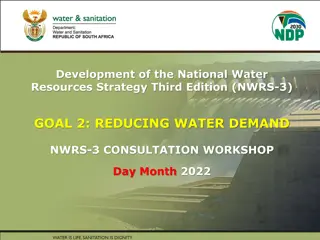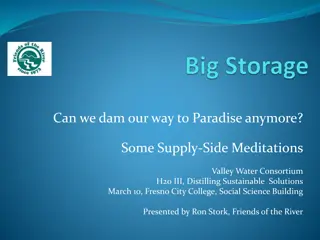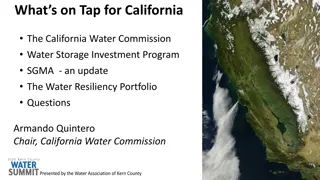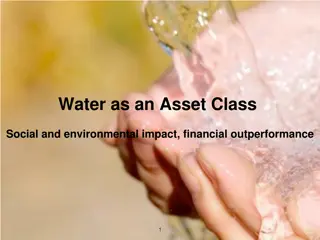Risk Assessment Study of PPCPs in Recycled Water
This study focuses on providing quantitative human health risk assessment results related to pharmaceuticals and personal care products (PPCPs) in recycled water. The research aims to develop tools to communicate findings and targets non-potable recycled water uses. Various compounds of interest and non-potable exposure scenarios are examined to assess potential risks associated with PPCPs. The study aims to enhance understanding and address concerns regarding the presence of contaminants in recycled water.
Download Presentation

Please find below an Image/Link to download the presentation.
The content on the website is provided AS IS for your information and personal use only. It may not be sold, licensed, or shared on other websites without obtaining consent from the author. Download presentation by click this link. If you encounter any issues during the download, it is possible that the publisher has removed the file from their server.
E N D
Presentation Transcript
Risk Assessment Study of PPCPs in Recycled Water to Support Public Review A WATEREUSE RESEARCH FOUNDATION PROJECT 2011 WateReuse California Annual Conference March 21, 2011
Chemicals of Emerging Concern New Resource Dirty Water We Don t Trust you !!! Chemical Cocktail Kills Fish Unsafe for Kids Contaminants Microconstituents
WRRF 09-07 Research update: Risk assessment study of PPCPs in Recycled Water to support public review Laura Kennedy Jean Debroux, PhD Mark Millan
Study Objectives Provide quantitative human health risk assessment results Develop message delivery tools to communicate the results Focus on non-potable recycled water uses Focus on pharmaceuticals and personal care products (PPCPs) in recycled water Utilize existing studies for occurrence and toxicity data
Compounds of Interest PPCP Type of Substance Over the counter (OTC) pharmaceutical OTC pharmaceutical Common usage Non-steroidal anti- inflammatory Analgesic Synthetic and naturally occurring hormone Antidepressant Stimulant Antimicrobial Antibiotic Ibuprofen Acetaminophen 17-beta estradiol Prescription pharmaceutical Fluoxetine Caffeine Triclosan Sulfamethoxazole N,N-Diethyl-meta- toluamide (DEET) Perfluorooctanesulfoni c acid (PFOS) Prescription pharmaceutical Ingredient in food and drink Personal care product Prescription pharmaceutical Personal care product Insect repellant Organic compound formerly used in common products Organic compound used in common products Fluorosurfactant Various uses, primarily plastics manufacturing Bisphenol A
Non-Potable Exposure Scenarios Parks, playgrounds, school yards: Children Agricultural irrigation: Agricultural workers Freeway, highway, and urban landscaping: Landscape workers Golf courses: Golfers
Acceptable Daily Intakes for COIs Acceptable Daily Intake (ug/kg-day) Compound Effect cardiovascular, developmental hepatotoxicity endocrine, reproductive, carcinogen developmental central nervous system, cardiovascular systemic (no effect) Ibuprofen 9.70E-01 Acetaminophen 3.10E+00 17-beta estradiol 2.60E-05 Fluoxetine 9.70E-02 Caffeine 1.50E+06 Triclosan 3.00E+00 Sulfamethoxazole developmental 3.80E+00 DEET neurological 2.30E+00 PFOS systemic 3.00E-02 Bisphenol A developmental 5.00E-01
Acceptable Concentrations Based on exposure and toxicity assessments Concentrations that can be present in recycled water and not exceed the acceptable daily intake If actual concentrations are less than acceptable concentrations, adverse health effects are unlikely g/kg ADI ( - day) g/L) = Acceptable Concentrat ion ( Exposure(L /kg day)
Risk Assessment Results 90th Percentile Concentration Detected in Recycled Water ( g/L) 0.5 0.0084 0.031 1.4 0.09 0.29 1.5 0.49 0.9 0.55 Acceptable Concentration in Recycled Water ( g/L) Child on Playground Agricultural Worker Landscape Worker Golfer Ibuprofen 17-beta estradiol Fluoxetine Sulfamethoxazole PFOS Bisphenol A DEET Triclosan Caffeine Acetaminophen 890 0.39 180 70,000 630 1,300 18,000 1,400 30,000M 57,000 1,700 0.18 320 38,000 310 2,000 17,000 3,100 15,000M 30,000 530 0.05 100 12,000 96 620 5,200 970 4,700M 9,500 1,600 0.15 350 190,000 1,800 2,500 38,000 2,700 85,000M 150,000 M = Million
Relative Risk Results Provide context for exposures to PPCPs Provide context for risks from recycled water Used in development of communication tools
Relative Risks for PPCPs Years of Non-Potable Recycled Water Exposure to Reach Common Exposure of Same PPCP for each Scenario Child on Playground Worker 67,000 28,000 Agricultural Landscape Worker 8,600 Golfer Comparison Exposure one Advil tablet (200 mg) hormone replacement daily dose (0.5 mg) one dose (20 mg) one dose (800 mg) estimated daily adult intake from environmental factors (1,071 ng) estimated daily adult intake from food (13 ug) one application of DeepWoods Sportsman Off! to arms, hands, and lower legs (110,000 mg for child, 450,000 mg for adult ) an adult washing hands for 30 seconds with anti- bacterial soap (91 mg) one extra-strength Tylenol tablet (500 mg) one cup of coffee (100 mg) Ibuprofen 26,000 17-beta estradiol 160,000 16,000 5,000 13,000 Fluoxetine Sulfamethoxazole 220,000 1,900,000 83,000 220,000 26,000 69,000 91,000 1,100,000 PFOS 46 5 1.5 29 Bisphenol A 22 7.1 2.2 8.9 DEET 110,000,000 85,000,000 26,000,000 190,000,000 Triclosan 17,000 7,600 2,400 6,600 Acetaminophen 3,000,000 350,000 110,000 1,700,000 Caffeine 410,000 44,000 14,000 250,000
Conclusions of Risk Assessment PPCPs in recycled water are not likely to result in adverse health effects for non-potable uses Exposure to PPCPs in recycled water is much less than common daily exposures to PPCPs
Communicating the Results Community Outreach Materials: Backgrounders, brochures, fact sheets and FAQs Key Messages All outreach items were tested in Focus Groups All will be made available via WateReuse outlets; hard copies and on internet sites
Communicating in a way that is easily understood www.athirstyplanet.com www.Watereuse.org
Participating Agencies City of Santa Rosa (CA) City of Redwood City (CA) Inland Empire Utility Agency (CA) Santa Clara Valley Water District (CA) South Bay Water Recycling (CA) City of Oxnard (CA)
Project Advisory Committee Elizabeth Sloss, Rand Corporation James Crook, Environmental Engineering Consultant Marsi A. Steirer, City of San Diego Public Utilities Department Rick Pleus, Intertox Yuliana Porras, United States Bureau of Reclamation
Risk Assessment Study of PPCPs in Recycled Water to Support Public Review QUESTIONS? 2011 WateReuse California Annual Conference March 21, 2011
